Intriguing Facts About The Summer Olympics
Nathan Johnson
Published
08/08/2016
in
wow
The Modern Olympic Games are the leading international sporting event
- List View
- Player View
- Grid View
Advertisement
-
1.
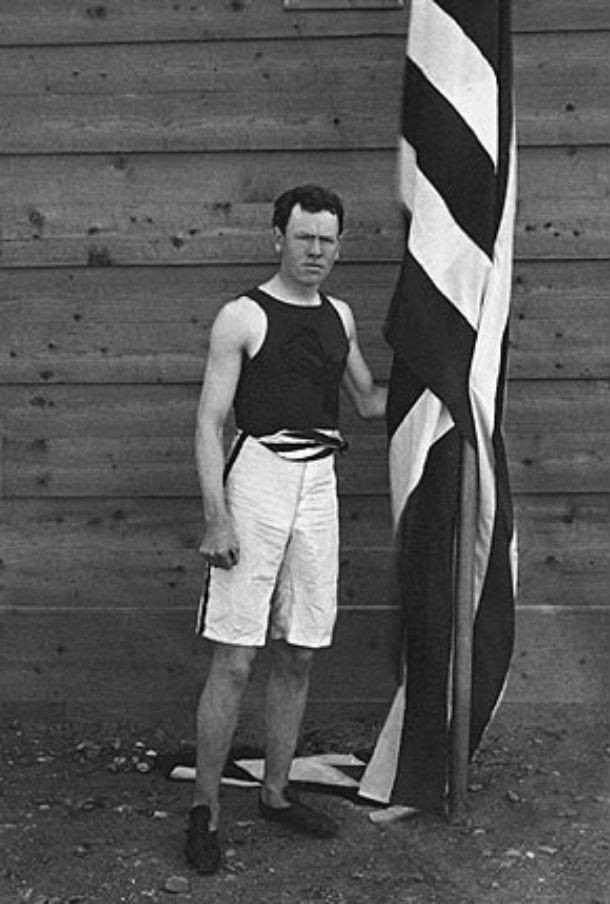 American athlete James Connolly won the first medal of the modern era at the 1896 Athens Games. Connolly competed in the triple jump and emerged victorious, becoming the first Olympic champion since the last Olympics were held, about fifteen hundred years earlier.
American athlete James Connolly won the first medal of the modern era at the 1896 Athens Games. Connolly competed in the triple jump and emerged victorious, becoming the first Olympic champion since the last Olympics were held, about fifteen hundred years earlier. -
2.
 The modern Olympics have been canceled only three times. The 1916 Summer Olympics in Berlin were canceled because of WWI. The 1940 Summer Olympics in Helsinki, as well as the 1944 Summer Olympics in London, were canceled because of WWII.
The modern Olympics have been canceled only three times. The 1916 Summer Olympics in Berlin were canceled because of WWI. The 1940 Summer Olympics in Helsinki, as well as the 1944 Summer Olympics in London, were canceled because of WWII. -
3.
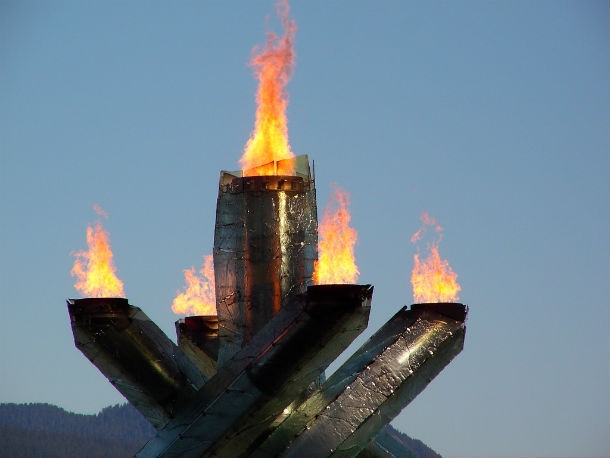 The Olympic flame might have appeared for the first time in the Summer Olympics of 1928 in Amsterdam but it’s a tradition and practice that has its roots in antiquity. In Olympia (Greece), a flame was ignited by the sun and then kept burning until the closing of the ancient Games. The flame itself represents a number of things, including purity and the endeavor for perfection.
The Olympic flame might have appeared for the first time in the Summer Olympics of 1928 in Amsterdam but it’s a tradition and practice that has its roots in antiquity. In Olympia (Greece), a flame was ignited by the sun and then kept burning until the closing of the ancient Games. The flame itself represents a number of things, including purity and the endeavor for perfection. -
4.
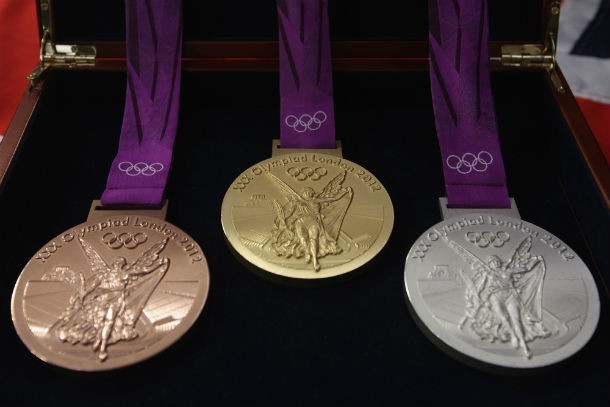 Since the 1904 Olympics, medals are awarded in each event: gold for first place, silver for second, and bronze for third.
Since the 1904 Olympics, medals are awarded in each event: gold for first place, silver for second, and bronze for third. -
5.
 When choosing locations for the Olympic Games, the IOC specifically gives the honor of holding the Games to a city rather than a country.
When choosing locations for the Olympic Games, the IOC specifically gives the honor of holding the Games to a city rather than a country. -
6.
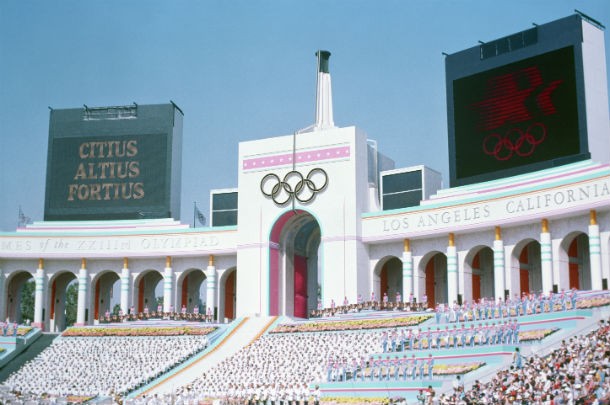 The United States has hosted the Summer Olympics more times than any other nation, four in total: St. Louis in 1904, Los Angeles in 1932 and 1984, and Atlanta in 1996.
The United States has hosted the Summer Olympics more times than any other nation, four in total: St. Louis in 1904, Los Angeles in 1932 and 1984, and Atlanta in 1996. -
7.
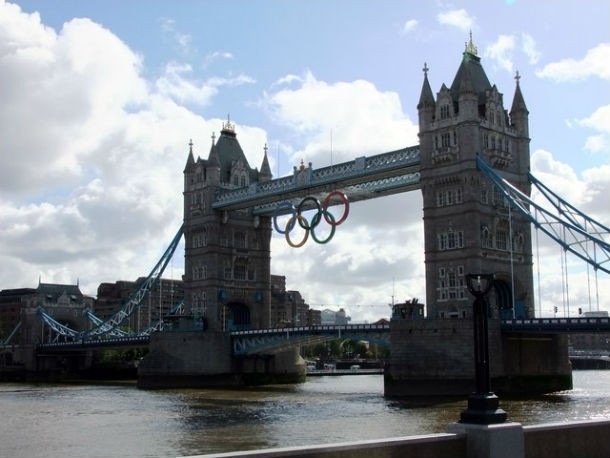 On the other hand London, England, hosted the Summer Olympics in 1908, 1948, and 2012, making it the only city to host the event on three occasions. In addition to that record, London also has the honor of being the first city to host the Paralympics, which took place in 1948 for wounded veterans.
On the other hand London, England, hosted the Summer Olympics in 1908, 1948, and 2012, making it the only city to host the event on three occasions. In addition to that record, London also has the honor of being the first city to host the Paralympics, which took place in 1948 for wounded veterans. -
8.
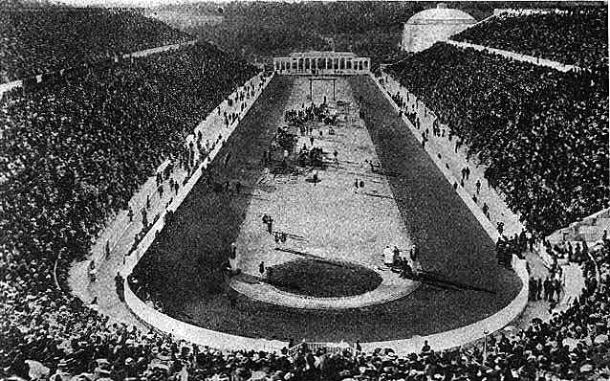 The 1906 Intercalated Games, or 1906 Olympic Games, was an international multisport event that was celebrated in Athens, Greece and were at the time considered to be Olympic Games by the International Olympic Committee (IOC). As more stress was placed on the continuing sequence of four-year Olympiads, the games of 1906 did not qualify anymore and today the IOC does not recognize the 1906 Games as Olympics but rather a separate sporting event that celebrated the tenth anniversary of the first modern Games.
The 1906 Intercalated Games, or 1906 Olympic Games, was an international multisport event that was celebrated in Athens, Greece and were at the time considered to be Olympic Games by the International Olympic Committee (IOC). As more stress was placed on the continuing sequence of four-year Olympiads, the games of 1906 did not qualify anymore and today the IOC does not recognize the 1906 Games as Olympics but rather a separate sporting event that celebrated the tenth anniversary of the first modern Games. -
9.
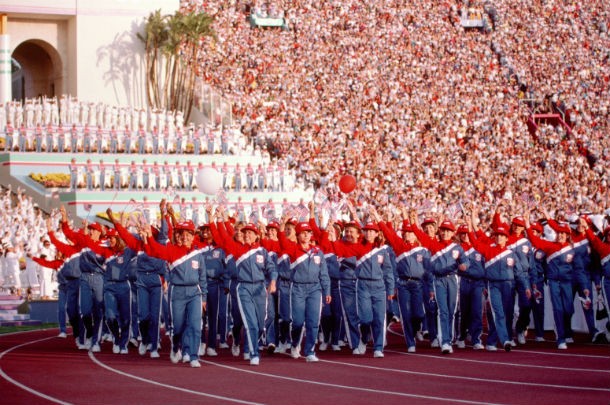 As of 2012, the USA is the nation with the most medals since it has won more gold (976), more silver (758), more bronze (666), and more total medals (2,400) than any other nation at the Summer Games.
As of 2012, the USA is the nation with the most medals since it has won more gold (976), more silver (758), more bronze (666), and more total medals (2,400) than any other nation at the Summer Games. -
10.
 Sports history would have probably been different if the Soviet Union had competed in all the Olympic Games from 1896 to 2012 like the United States (excluding the 1980 Moscow Olympics). The Soviet Union first participated in the Summer Games in 1952, and competed at the Games on eight occasions since then (until the 1988 Olympics). At six of its nine appearances at the Summer Games, the team ranked first in the total number of medals won. Additionally, the Soviet team was ranked first in the medal count seven times and second twice in their nine appearances at the Winter Games.
Sports history would have probably been different if the Soviet Union had competed in all the Olympic Games from 1896 to 2012 like the United States (excluding the 1980 Moscow Olympics). The Soviet Union first participated in the Summer Games in 1952, and competed at the Games on eight occasions since then (until the 1988 Olympics). At six of its nine appearances at the Summer Games, the team ranked first in the total number of medals won. Additionally, the Soviet team was ranked first in the medal count seven times and second twice in their nine appearances at the Winter Games. -
11.
 Greece is widely known as the motherland of the ancient Olympic Games but also holds a very notable record in the modern Games that not many are aware of. During the first modern Summer Olympics, held in Athens in 1896, Greece won a total of forty-six medals with a total population of 2.4 million. In other words, Greece won one medal for every 52,900 citizens, setting an incredible record for the most medals won per capita at any Olympics (still a record today).
Greece is widely known as the motherland of the ancient Olympic Games but also holds a very notable record in the modern Games that not many are aware of. During the first modern Summer Olympics, held in Athens in 1896, Greece won a total of forty-six medals with a total population of 2.4 million. In other words, Greece won one medal for every 52,900 citizens, setting an incredible record for the most medals won per capita at any Olympics (still a record today). -
12.
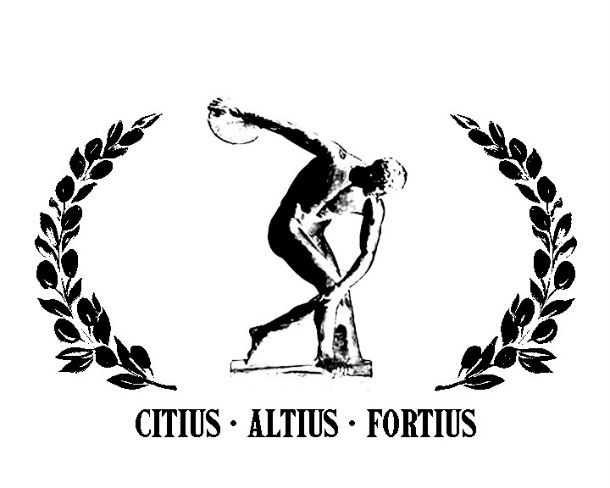 The Olympic motto was “born” in 1921 when Pierre de Coubertin, founder of the modern Olympic Games, borrowed a Latin phrase from his friend, Father Henri Didon: Citius, Altius, Fortius (“Swifter, Higher, Stronger”).
The Olympic motto was “born” in 1921 when Pierre de Coubertin, founder of the modern Olympic Games, borrowed a Latin phrase from his friend, Father Henri Didon: Citius, Altius, Fortius (“Swifter, Higher, Stronger”). -
13.
 American swimmer Michael Phelps is the most decorated Olympian of all time, with a total of twenty-two medals in three Olympic Games. Phelps also holds the all-time record for Olympic gold medals (eighteen, double the second highest record holders). In winning eight gold medals at the 2008 Beijing Games, Phelps also broke the record of fellow American swimmer Mark Spitz (seven gold medals at the 1972 Summer Olympics in Munich) for the most gold medals at any single Olympic Games.
American swimmer Michael Phelps is the most decorated Olympian of all time, with a total of twenty-two medals in three Olympic Games. Phelps also holds the all-time record for Olympic gold medals (eighteen, double the second highest record holders). In winning eight gold medals at the 2008 Beijing Games, Phelps also broke the record of fellow American swimmer Mark Spitz (seven gold medals at the 1972 Summer Olympics in Munich) for the most gold medals at any single Olympic Games. -
14.
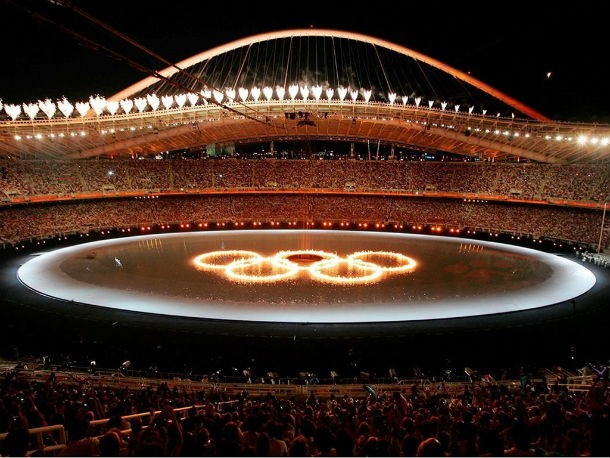 Greece, Australia, France, Great Britain, and Switzerland are the only countries to have had representatives at every Summer Olympics.
Greece, Australia, France, Great Britain, and Switzerland are the only countries to have had representatives at every Summer Olympics. -
15.
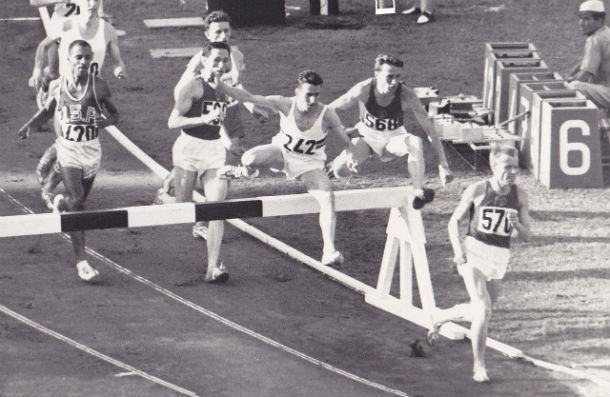 The first Olympics covered by US television was the 1960 Summer Games in Rome by CBS.
The first Olympics covered by US television was the 1960 Summer Games in Rome by CBS. -
16.
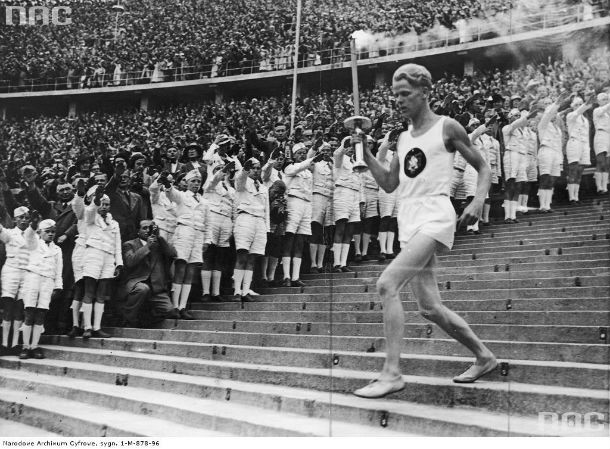 However, the 1936 Berlin Olympics (also known as the “Nazi” Olympics) were the first Games to ever be televised period. Before the advent of television, sports fans had to make due with radio commentary, and before radios were ubiquitous, you could only read about the results of the events in the newspaper.
However, the 1936 Berlin Olympics (also known as the “Nazi” Olympics) were the first Games to ever be televised period. Before the advent of television, sports fans had to make due with radio commentary, and before radios were ubiquitous, you could only read about the results of the events in the newspaper. -
17.
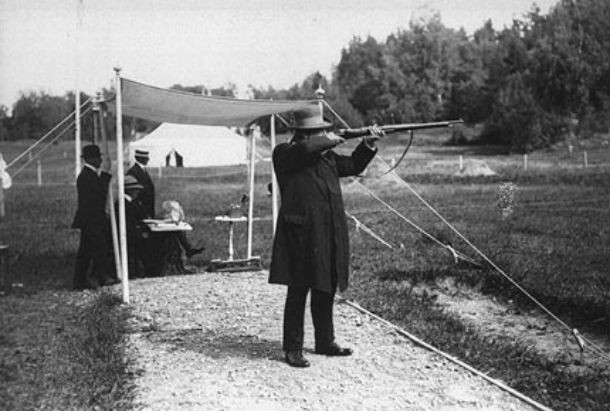 At age seventy-two, Oscar Swahn (a Swedish shooter) was the oldest sportsman to compete in the 1920 Summer Olympics. Swahn set a record that lasts to this day: he earned second place in the double shot running deer contest with the Swedish team and he remains the oldest medalist of all time
At age seventy-two, Oscar Swahn (a Swedish shooter) was the oldest sportsman to compete in the 1920 Summer Olympics. Swahn set a record that lasts to this day: he earned second place in the double shot running deer contest with the Swedish team and he remains the oldest medalist of all time -
18.
 On the other hand, Dimitrios Loundras holds a record that we can’t see breaking anytime soon. Loundras was a Greek gymnast and a boy wonder who took part in the Olympics of 1896. When he won bronze in his sport he became the youngest athlete ever to win a medal at the Olympics and he remains the youngest competitor and medalist on record. He was only ten years and 218 days old when he won.
On the other hand, Dimitrios Loundras holds a record that we can’t see breaking anytime soon. Loundras was a Greek gymnast and a boy wonder who took part in the Olympics of 1896. When he won bronze in his sport he became the youngest athlete ever to win a medal at the Olympics and he remains the youngest competitor and medalist on record. He was only ten years and 218 days old when he won. -
19.
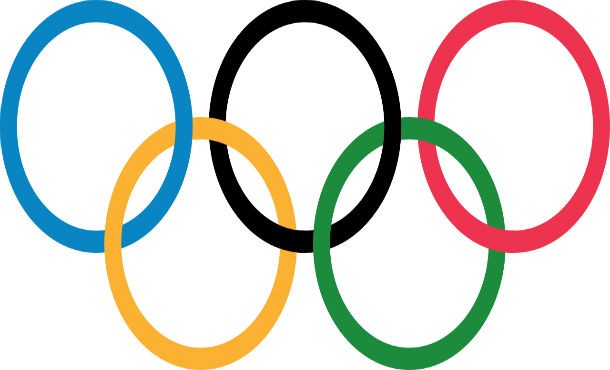 The five Olympic rings represent the five major regions of the world: Africa, the Americas, Asia, Europe, and Oceania, and every national flag in the world includes one of the five colors, which are (from left to right) blue, yellow, black, green, and red.
The five Olympic rings represent the five major regions of the world: Africa, the Americas, Asia, Europe, and Oceania, and every national flag in the world includes one of the five colors, which are (from left to right) blue, yellow, black, green, and red. -
20.
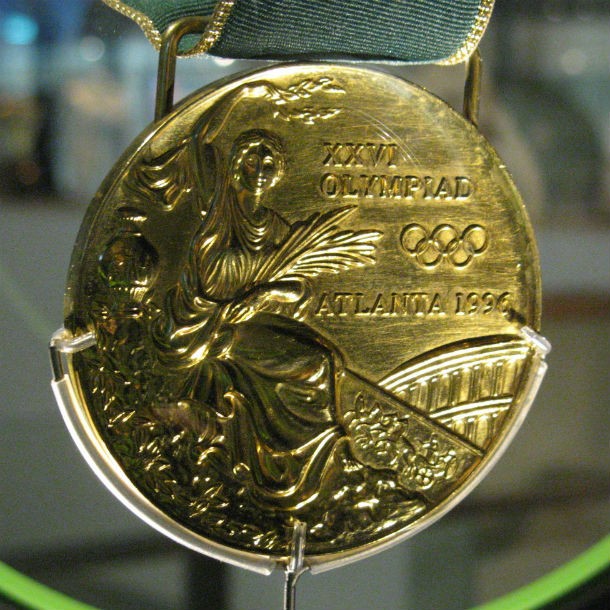 Contrary to popular belief gold medals aren’t really gold. See, the gold medals awarded now are actually silver with gold plating. The last gold medals that were made entirely out of gold were awarded in the 1912 Summer Olympics in Stockholm, Sweden.
Contrary to popular belief gold medals aren’t really gold. See, the gold medals awarded now are actually silver with gold plating. The last gold medals that were made entirely out of gold were awarded in the 1912 Summer Olympics in Stockholm, Sweden. -
21.
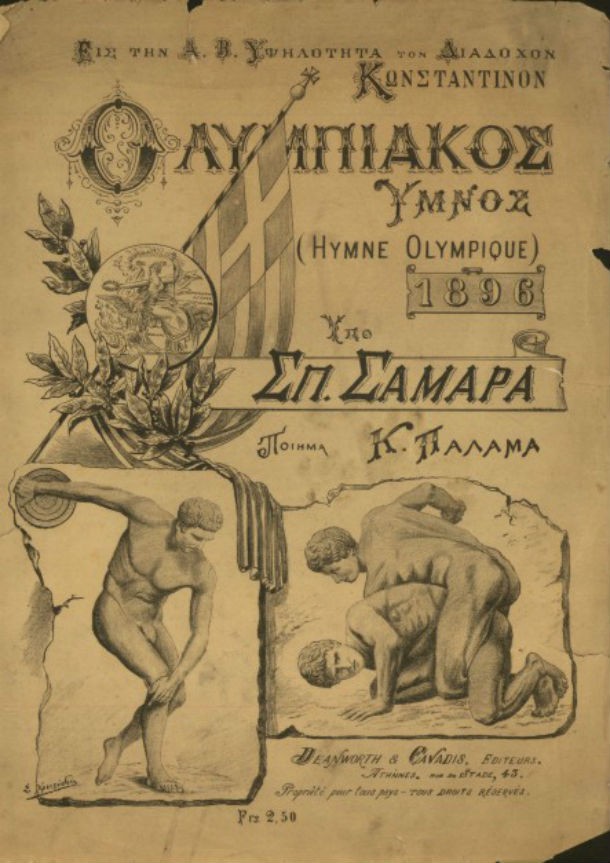 The Olympic Hymn, played when the Olympic flag is raised, was composed by Spyros Samaras and the words written by the Greek poet Kostis Palamas. The Olympic Hymn was first played at the 1896 Games in Athens but wasn’t declared the official hymn by the IOC until 1957.
The Olympic Hymn, played when the Olympic flag is raised, was composed by Spyros Samaras and the words written by the Greek poet Kostis Palamas. The Olympic Hymn was first played at the 1896 Games in Athens but wasn’t declared the official hymn by the IOC until 1957. -
22.
 The chairman of the organizing committee for the 1936 Olympic Games, Carl Diem, was the one who suggested the modern Olympic torch relay. The Olympic flame is lit at the ancient site of Olympia by eleven women, representing the Vestal Virgins, who perform a celebration at the Temple of Hera in which the torch is kindled by the light of the Sun, its rays concentrated by a parabolic mirror. The Olympic torch is then passed from runner to runner from the ancient site all the way to the Olympic stadium in the host city, in a process that lasts several months. The flame is then kept alight until the Games have concluded just as they were in the ancient Olympics.
The chairman of the organizing committee for the 1936 Olympic Games, Carl Diem, was the one who suggested the modern Olympic torch relay. The Olympic flame is lit at the ancient site of Olympia by eleven women, representing the Vestal Virgins, who perform a celebration at the Temple of Hera in which the torch is kindled by the light of the Sun, its rays concentrated by a parabolic mirror. The Olympic torch is then passed from runner to runner from the ancient site all the way to the Olympic stadium in the host city, in a process that lasts several months. The flame is then kept alight until the Games have concluded just as they were in the ancient Olympics. -
23.
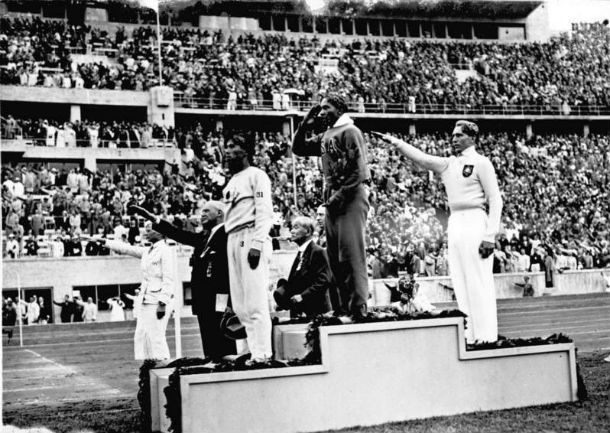 Despite the usual narrative of the 1936 Summer Olympics about Adolf Hitler leaving the Berlin stadium ashamed and defeated by Jesse Owens, in reality Nazi Germany destroyed any serious competition they had during those Games. Germany won a total of eighty-nine medals (thirty-three gold) while the second country on the medal table, the United States, won fifty-six, with twenty-four of them gold.
Despite the usual narrative of the 1936 Summer Olympics about Adolf Hitler leaving the Berlin stadium ashamed and defeated by Jesse Owens, in reality Nazi Germany destroyed any serious competition they had during those Games. Germany won a total of eighty-nine medals (thirty-three gold) while the second country on the medal table, the United States, won fifty-six, with twenty-four of them gold. -
24.
 During the 2004 Olympics in Athens, the shot put was held in Olympia, site of the ancient Games, and that was the first time female athletes competed in Olympia since women couldn’t compete in the ancient Games. In the same Olympics the archery competition was held in Panathinaiko Stadium, in which the first modern Olympics were held.
During the 2004 Olympics in Athens, the shot put was held in Olympia, site of the ancient Games, and that was the first time female athletes competed in Olympia since women couldn’t compete in the ancient Games. In the same Olympics the archery competition was held in Panathinaiko Stadium, in which the first modern Olympics were held. -
25.
 The first Olympic drug suspension did not occur until 1968. Hans-Gunnar Liljenwall, a Swedish pentathlete, tested positive for alcohol. He purportedly drank several beers before the pentathlon and was suspended from the competition.
The first Olympic drug suspension did not occur until 1968. Hans-Gunnar Liljenwall, a Swedish pentathlete, tested positive for alcohol. He purportedly drank several beers before the pentathlon and was suspended from the competition.
- REPLAY GALLERY
-

- Intriguing Facts About The Summer Olympics
American athlete James Connolly won the first medal of the modern era at the 1896 Athens Games. Connolly competed in the triple jump and emerged victorious, becoming the first Olympic champion since the last Olympics were held, about fifteen hundred years earlier.
25/25
1/25
Categories:
Wow








0 Comments